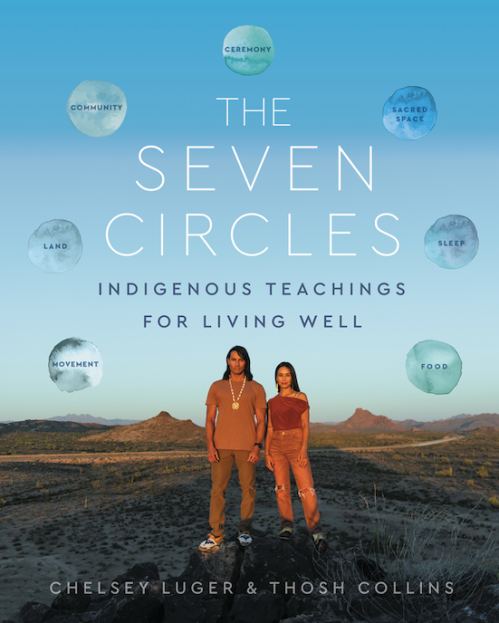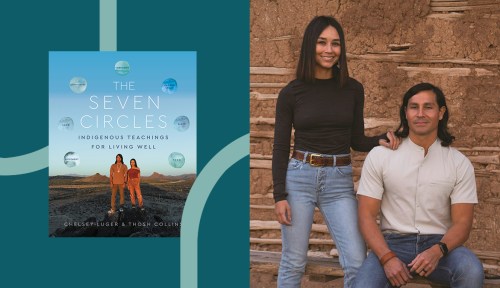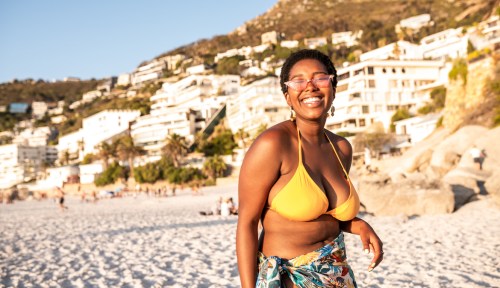Our editors independently select these products. Making a purchase through our links may earn Well+Good a commission
Chelsey Luger and her husband Thosh Collins have long advocated and highlighted Indigenous peoples’ way of life and perspective on wellness, particularly through their wellness initiative—Well for Culture. Now, the couple has released their book The Seven Circles, which examines and gives doable practices in the seven areas that are critical to overall health: food, ceremony, movement, sleep, sacred space, community, and connection to land.
In this book, the authors help you explore these spaces, with the help of intimate Indigenous ancestral knowledge, to navigate your own spiritual, physical, and emotional well-being. We chatted with Luger to get into what the book can offer you, as well as why it’s so important to examine wellness through different lenses.

The Seven Circles — $30.00
Well+Good: Indigenous wellness, as you and Thosh state, can be a lot of different things. How do you like to define it in a couple of sentences?
Chelsey Luger: Indigenous wellness means that Indigenous worldviews, values, knowledge, and methodologies are centered and honored while approaching a well, balanced lifestyle. This can look like many different things for many different people. Our approach, specifically, is a model called the Seven Circles of Wellness, which lays out a map for addressing mental, physical, spiritual, and emotional well-being. It’s not something that all Indigenous people follow, but it’s definitely something that our audience has connected to and found helpful—whether Indigenous or not.
W+G: What’s the biggest hurdle to incorporating these practices in to one’s life? Is it a mindset shift in how we think about wellness?
CL: For Indigenous people, approaching wellness with our cultural and spiritual worldviews at the center is very intuitive, because these tend to be teachings that we were raised with. Due to the ever-present issue of racism and discrimination, we often have to get over the hurdle of feeling welcome at all in a wellness space. But once we build that confidence, and we allow ourselves to integrate our cultural and spiritual teachings with a wellness lifestyle, everything clicks and it becomes very empowering.
For non-Indigenous people, the biggest hurdle is in learning about settler colonialism, and how this history is absolutely essential in understanding why people from all walks of life struggle with health today. But once that becomes clear, the path toward collective healing reveals itself.
Most Americans know very little about Indigenous culture and history at all. It enriches our story and behooves us all to better understand Indigenous knowledge, and wellness is a beautiful lens through which one can get to know Indigenous people.
W+G: Indigeneity is vast and varied—what’s the unifying thing or a couple of unifying ideals that all/most communities share? How does that play into wellness?
CL: Many Indigenous people believe in seeking balance, not perfection. We are taught to be humble, that we are only human, and to accept life’s ups and downs. We also know that life is cyclical—everything is a continual journey, not a linear leap from point A to point B. This keeps us humble during good times and also keeps us hopeful during down times—we know that the universe will bring back balance to our life journey eventually.
Many Indigenous people and communities are also very familiar with the concept of interconnectedness. It’s clear to us that what’s good for our physical health is also good for our mental, spiritual, and emotional health. Our ancestors never put these things into separate categories and boxes, as the western world does. All things are interconnected.
W+G: What do you think is the hardest of the seven circles to incorporate into your own life? Why?
CL: There are always ups and downs in life, and so on any given day, one of the seven circles may be more or less difficult to incorporate than another. For example, sometimes I wake up feeling very excited for a workout that I’ve planned for that day, while other times it feels nearly impossible to conjure up that type of energy. So, it changes day-to-day. The good news is that the seven circles are a map of opportunity. Even if you haven’t engaged in a movement practice, they will essentially show you that there are other options for engaging in wellness, such as cooking a nourishing meal, getting a good night of sleep, tidying up to make your home feel like a “sacred space,” and so on. Wellness is so much more than just diet and exercise, and this book embraces that fact.
“Wellness is so much more than just diet and exercise, and this book embraces that fact.” —Chelsey Luger
W+G: How can people be respectful of Indigenous people and practices?
CL: While writing this book, we kept in mind that as voices of Indigenous wellness, we have a big responsibility to shoulder. We are always supported by, but also held accountable by, our communities, and so it was no question that we would write about the topic of cultural appropriation in a way that clearly explains how deeply rooted its history is, and how harmful it can be. Readers will find these details in the Ceremony chapter. We are confident that they will walk away with a desire to support Indigenous people in our cultural privacy when needed, and also to support Indigenous language and cultural revitalization programs that benefit Indigenous youth, as opposed to feeling a continued desire to exploit or appropriate our spirituality, as has been so prevalent in the wellness industry.
W+G: Anything else you want to share about the book or wellness in relation to Indigenous practices?
CL: We are thrilled to be a part of the growing and ongoing movement for decolonizing wellness and reclaiming health in Indigenous communities, and we are honored by the opportunity to share our perspective on Indigenous wellness with the world. You will find that The Seven Circles is a no-judgment zone. Ideally, it will help readers to not only expand their understanding of wellness, but also embrace their own power and gifts that they were born with.
You can buy the book for $29.99 on Bookshop.org and Amazon or wherever books are sold.
Sign up for the Well+Good SHOP Newsletter
Get exclusive deals on wellness, beauty, fitness, and food products that have been hand-picked by our editors.
Got it, you've been added to our email list.








